The decline of the US—or even of the West more generally—has been a persistent topic for years, and for some reason it's enjoying a mini-Renaissance right now. There is much talk, for example, that the dollar is losing its spot as the world's reserve currency. But it sure doesn't look like it:
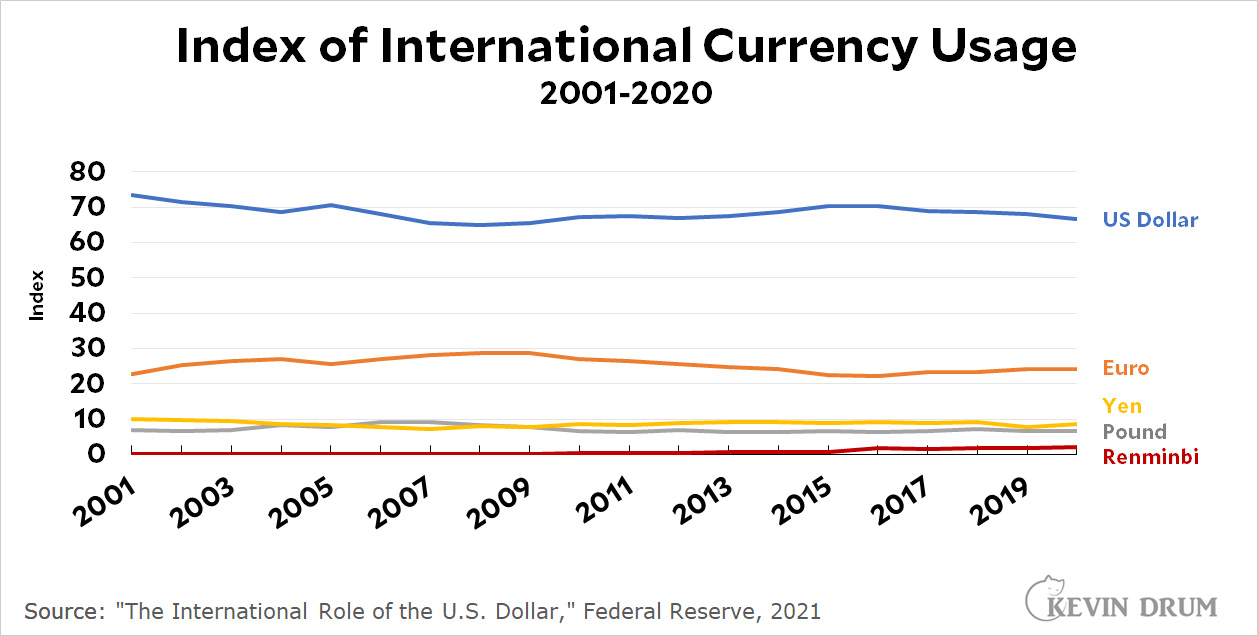 The dollar lost a bit of influence during the Iraq War years, but that came to a hard stop in 2007, when the economy collapsed. There's nothing like a world crisis to remind people why they liked dollars in the first place, is there?
The dollar lost a bit of influence during the Iraq War years, but that came to a hard stop in 2007, when the economy collapsed. There's nothing like a world crisis to remind people why they liked dollars in the first place, is there?
The value of the dollar is fundamentally backed by our economic performance. Let's take a look at both the level and growth of GDP in the best-performing countries:
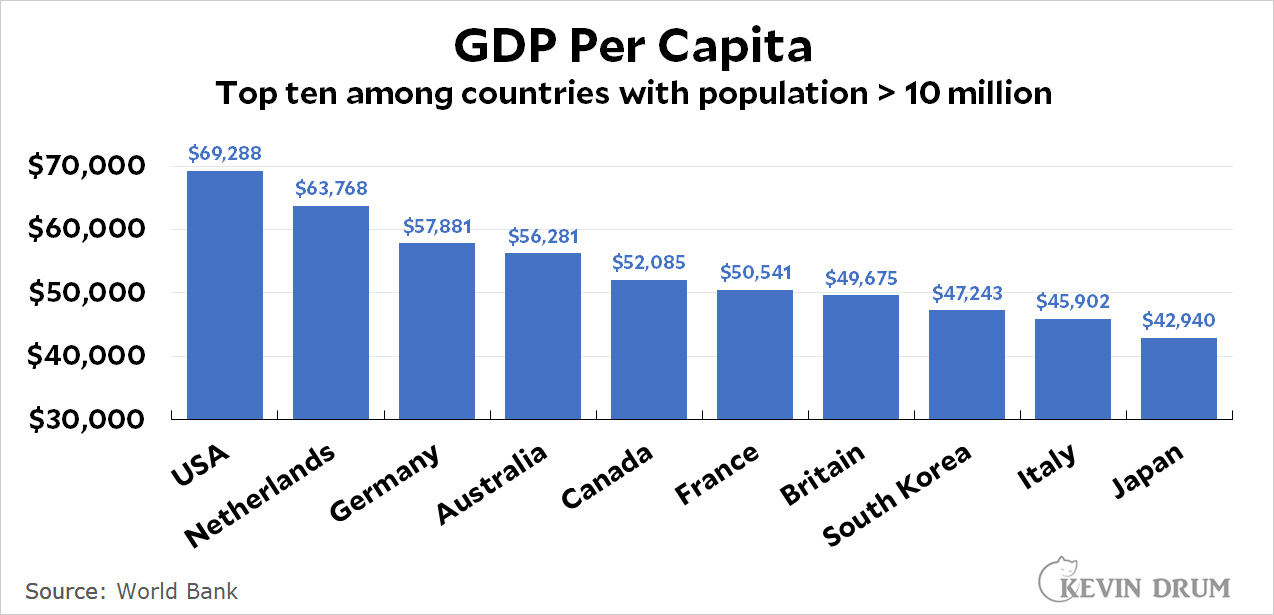
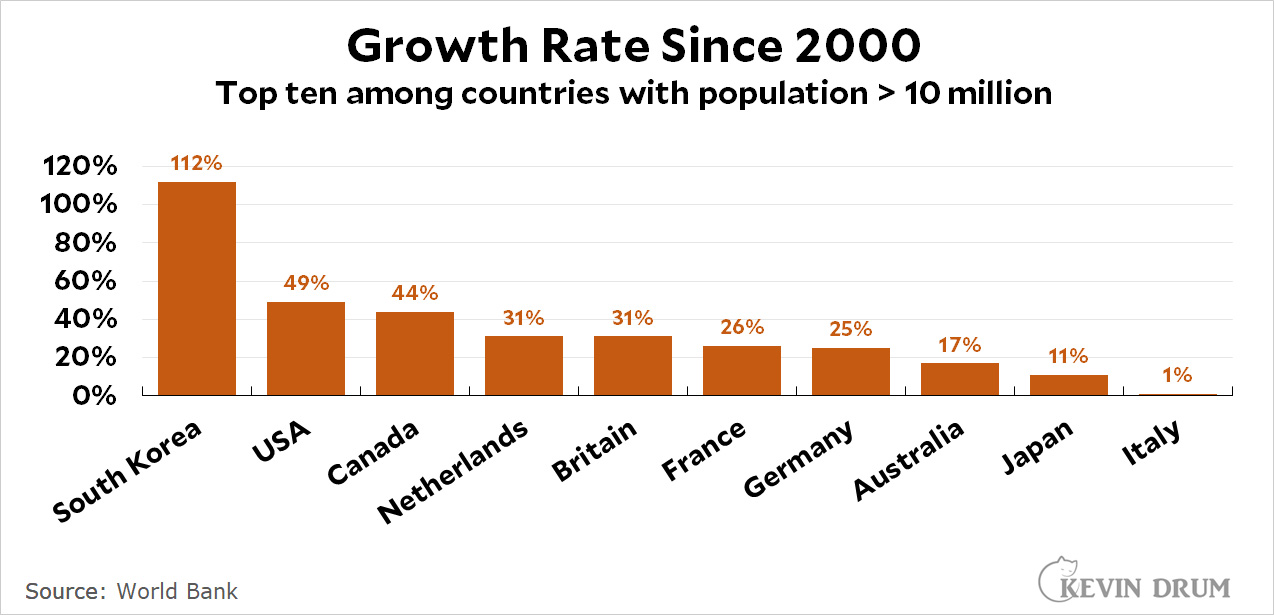 The US has the highest GDP per capita in the world among large-ish countries¹ and the fastest growth rate aside from South Korea, which started from a very low base.² You really ought to sit back for a minute and contemplate just how remarkable this is.
The US has the highest GDP per capita in the world among large-ish countries¹ and the fastest growth rate aside from South Korea, which started from a very low base.² You really ought to sit back for a minute and contemplate just how remarkable this is.
So our economy is not just big, it's also growing fast. And I hardly need to point out the well-known fact that we have a huge military to protect this economy:
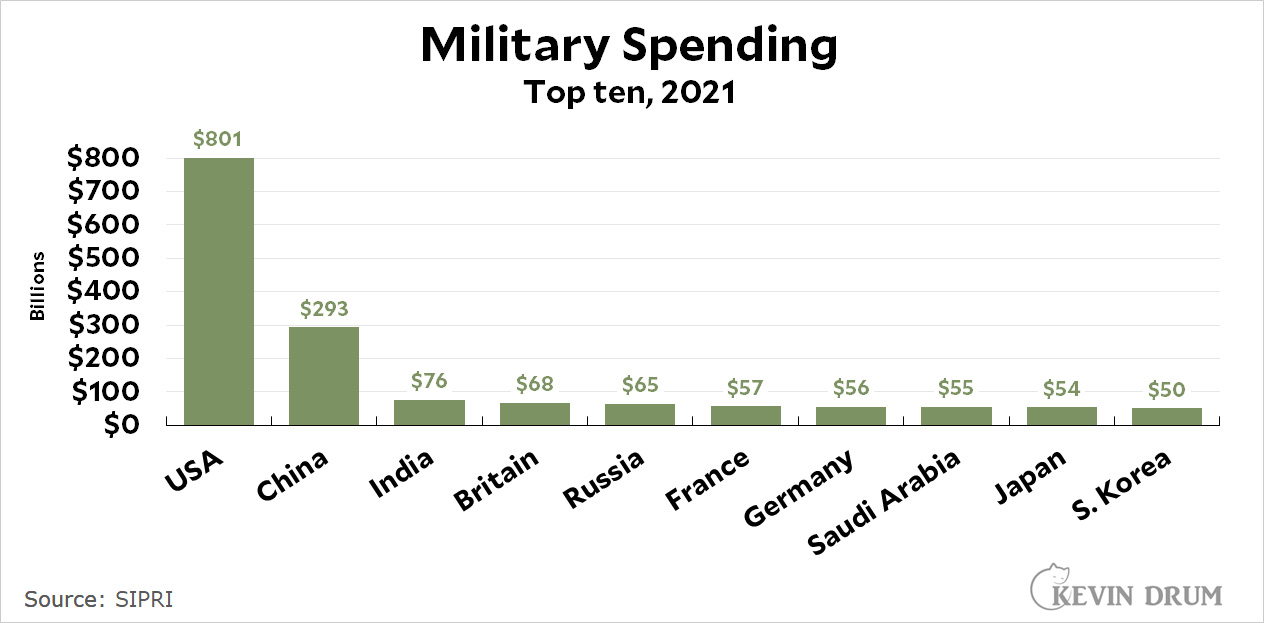 In fairness, despite the vast chasm between the US and China in military spending, it's an open question just how much it means. On the one hand, purchasing power parities and a cheap conscript-style army means China can field a lot more boots on the ground than we can. On the other hand, our technology is so far ahead of China's that we might outbulk them by more than 3:1 in real life. On the third hand, our military patrols the entire world while China's only has to patrol China itself and its nearby seas. On the fourth hand, the US potentially has all of NATO to call on in the case of a shooting war. On the fifth hand, it's not clear how vulnerable a classical navy like ours is to cheap, high tech drones and cruise missiles.
In fairness, despite the vast chasm between the US and China in military spending, it's an open question just how much it means. On the one hand, purchasing power parities and a cheap conscript-style army means China can field a lot more boots on the ground than we can. On the other hand, our technology is so far ahead of China's that we might outbulk them by more than 3:1 in real life. On the third hand, our military patrols the entire world while China's only has to patrol China itself and its nearby seas. On the fourth hand, the US potentially has all of NATO to call on in the case of a shooting war. On the fifth hand, it's not clear how vulnerable a classical navy like ours is to cheap, high tech drones and cruise missiles.
All this said, it mostly applies to a shooting war over, say, Taiwan, not a war on American territory. There's not much question that two big oceans and nearly a trillion dollars worth of military spending make us all but impregnable on our own territory. Short of a nuclear war, there's no safer place on earth.
Here's another thing to look at for the world's large economic powers: population growth.
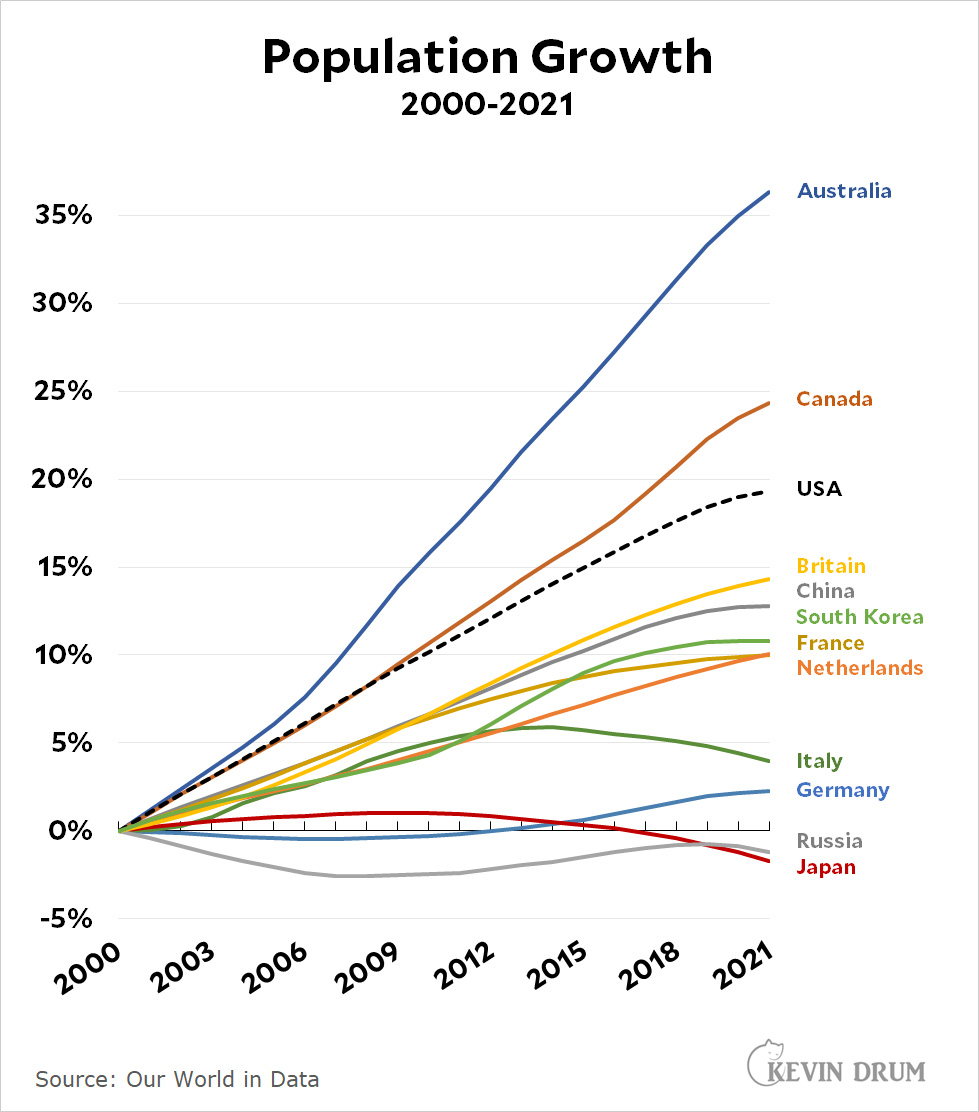 Unlike many rich countries, the US is still growing at a brisk pace. Here's education:
Unlike many rich countries, the US is still growing at a brisk pace. Here's education:
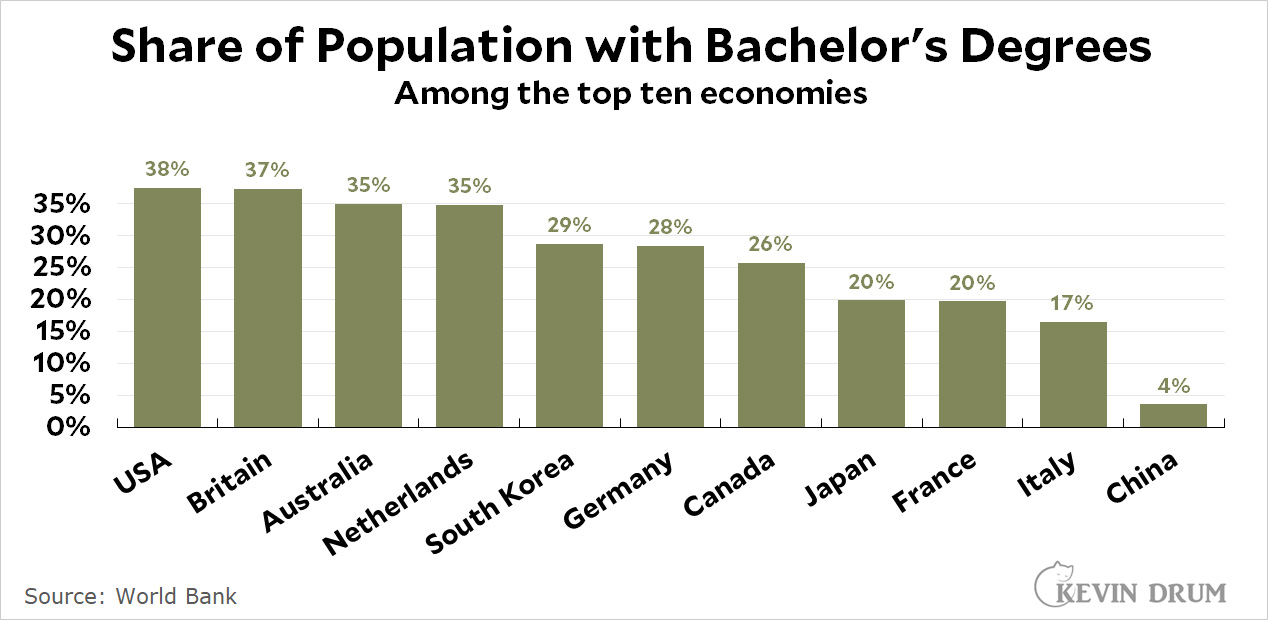
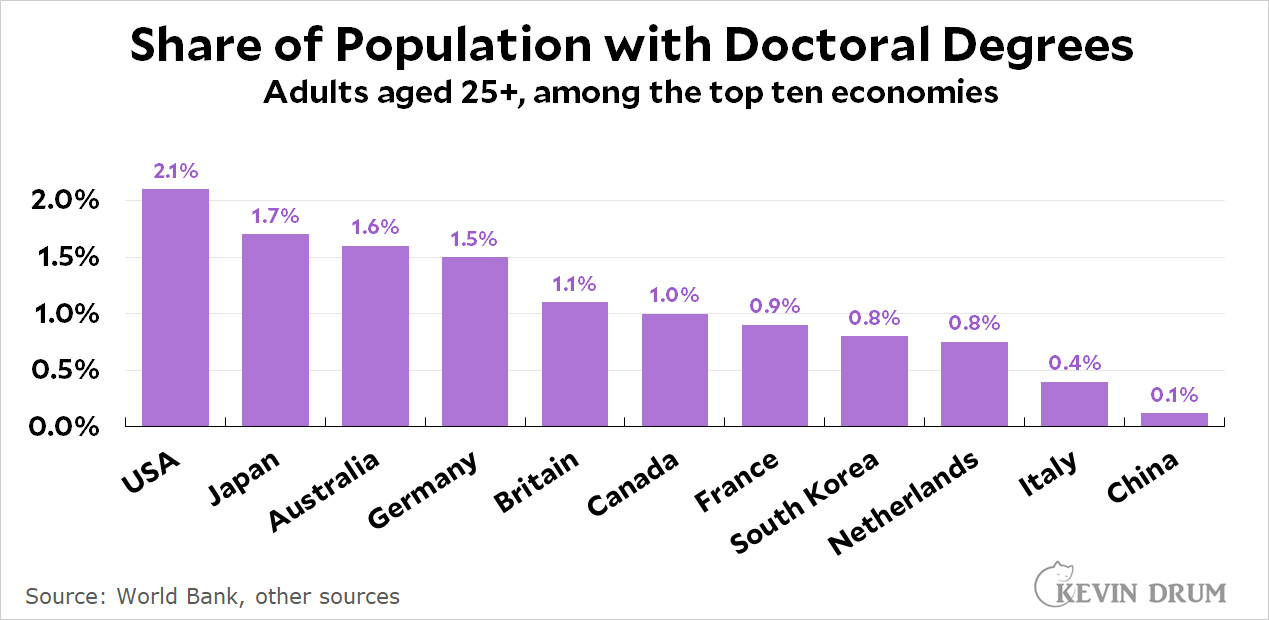 Finally, I was intrigued by this tweet quoting Larry Summers:
Finally, I was intrigued by this tweet quoting Larry Summers:
``What we get from China is an airport. What we get from the US is a lecture." - Larry Summers, describing convo w/leader of developing country and the loss of US global influence, in intv w/@DavidWestin today#China #BeltandRoad #USdollar
— Gabrielle Coppola (@gablova) April 14, 2023
This might be true, but it's largely because we've given developing countries so many airports already and it hasn't worked out so well. China is discovering the same thing today with its Belt and Road initiative: eventually there comes a time when your clients can't pay back their loans, and then what? Write off the investment and never go back? Demand repayment and become the bad guy? In terms of influence this is a losing game.
Also, while it might not be politically correct to point this out, Africa and South America combined account for 8% of world GDP. Does it really matter who has more influence in these places?
In summary: The dollar remains the world's reserve currency and shows no signs of that turning around anytime soon. Our GDP is the largest among big countries and our growth rate is second highest. Our military spending is wildly higher than anyone in the world. Our population growth is among the highest among rich nations. We have the most highly and broadly educated workforce. And while we may or may not be losing influence in the global south, does it really matter either way except at the margins?
There are plenty of things you can nitpick here, and plenty of qualitative arguments you can make against American supremacy. It's also clear that China has every intention of trying to match the US as a global superpower. But it has a very long row to hoe before it gets there. And by the time it matters, everything is going to depend on leadership in AI anyway—which is yet another area where the US has a dominant position.
Anyway, this is the case for the US retaining its crown as by far the most powerful nation in the world for a good long time. Aesthetics aside—de gustibus, after all—it's hard to make an argument for any other country being a better place for a young person to live for the rest of their life.
¹I excluded petrostate countries from this list for obvious reasons, though it doesn't change things much anyway.
²South Korea's growth rate has slowed considerably since 2010 and is now only slightly higher than ours.

America is a fine place, but as is acknowledged by the exclusion of certain states, GDPs aren't really a good argument as to where to live. At least not to the exclusion of everything else.
Violence, health, housing, income equality, civil rights and education all seem pretty important when making an argument like this. GDPs are important too, but not so important that literally everything else (other than being a country the author dislikes and excludes, lol) can be written off.
Still, if I’ve gotta pick one number, GDP per capita is what I’d go with
But you dont have to pick one.
"Our population growth is among the highest among rich nations."
That anybody thinks robust population growth is a good thing these days is difficult to understand. What's so great about it? It means a larger economy in nominal terms but per-capita isn't likely to change much and now you've got denser states and cities. Denser living means a lower quality of life for all but the rich.
California's population was ~20 million in the 1960s. It's nearly double that today. It's harder to get around because traffic corridors were built for a population that no longer exists. The "solution" is to abandon cars for light rail and bicycles. There's a greater demand for resources like water and food. More waste to dispose of.
Los Angeles City's density is half that of Hong Kong. If it equals it, will that be something to admire?
Better than Japan where they’ve got 20 million old farts and nobody to change their diapers
The Midwest can hold another 100 million anyways, no sweat. It’s barren out there, and not an uninhabitable desert
not yet an uninhabitable desert.
The problem isn't just rising or falling population, it's the rate of increase or decrease, and the shape of the population pyramid. The problem China faces is that it had a huge population bubble in the 1960s and 1970s that is approaching retirement age, and a huge decline in births that will affect their workforce for a generation.
Japan's population declined, but did so more slowly, so the standard of living remains extremely high. Would they benefit from a stable population? Probably, but that would require allowing vastly more immigrants, and neither the country nor the general population is willing to accept the cultural changes that would entail. Korea will face greater problems in this regard than Japan does, because their population will decline faster, they have less of a social safety net, and they are just as reluctant to accept immigrants (unless they reunify with North Korea, which would bring its own problems).
The U.S. (and e.g. Canada and Australia) have it easier because they can change their policies to encourage immigration relatively easily, in the event birth rates drop.
Denser living does not equal lower quality of life. This is a major error in your rationale.
You may prefer less density, but your preferences shouldnt be confused with society wide quality of life. The rural areas of America seem like a good place to start thinking about quality of life and density.
Denser living does not equal lower quality of life. This is a major error in your rationale.
Yep. The highest HDI locations are practically a who's who of countries that are very dense and/or highly urbanized (Japan, Netherlands, Singapore, Germany, Australia, Belgium, etc). Needless to say the USA also enjoys high HDI and is more than 80% urban. But, sure, some folks prefer living in the countryside, or at least imagine they would.
It's not about density. It's about finite resources, habitat loss, and pollution, if you care about those sorts of things, which I do. No one reasonable makes an argument against endless population growth by saying we literally have no place to park the extra humans. That is a straw man.
No one reasonable makes an argument against endless population growth by saying we literally have no place to park the extra humans. That is a straw man.
Who's making an argument for "endless population growth?"
The straw man is suggesting this is a thing while failing to acknowledge that almost all the news on that front of late has been unambiguously positive, ie, world population is now projected to peak even earlier than was thought just a few years ago, mainly because of the apparently rapid strengthening of a trend toward smaller families in the Global South.
https://www.theguardian.com/world/2023/mar/27/world-population-bomb-may-never-go-off-as-feared-finds-study
This is one of the greatest success stories humanity has yet managed. And it's curiously underreported.
You Club of Rome types really need to update your priors!
Continuing population growth of the nation with the largest per-capita emissions on the planet (excluding some of the petro-states) is not such a good thing.
There's more to celebrate than decry considering the substantial progress made by the country in reducing the carbon-intensity of the economy. US population is up approximately 19% since 2000 but C02 emissions have declined by nearly 20%.
https://www.macrotrends.net/countries/USA/united-states/carbon-co2-emissions
Hard stop in 2007, but then resumed the decline, however shallow, 8 years later circa 2015...
About that international currency usage index chart... so in 2001 it was something like 73. By 2020 it was at 67. So, a drop of 6 out of 73 or ... 8.2% over two decades - give or take since this was via Mk I eyeball.
Meanwhile, what was it in say 1981?
For that matter, look way down there at the bottom of the chart. Indeed, it is quite small, but it seems to be growing. Our friend the renminbi...
It isn't so much a question of where any one currency is "today" as where is it heading for "tomorrow." And the "long-term" trend for the good old greenback is to lose either 6 index points or 8% every 20 years...
"Does it really matter who has more influence in these places?"
Considering that people from these two regions are driving the majority of the population growth in the western nations that top all of your charts, I'd say the answer to that question matters a lot.
not to mention the natural resources
We don't really need influence to help with that, at least not in the traditional geopolitics manner. When women are educated and have access to birth control, population levels off. This is as close to an axiom as there is in the world of sociology.
I feel like this is the conclusion you reach when you only compare the stats of the largest nations, then limit the stats you're willing to look at, in order to show that the US is the best damned place for a young adult to live in.
On the other hand, obviously the US is not in decline, though conservatives seem intent on trying to take this country back 100+ years and make it resemble some backward, inward-looking nation.
On the back hand, the extreme expression of nationalism leads all nations to wars. Stop it. Let's talk about the protection of human rights and moral values.
On the under hand, if not for the massive naval fleet of the US, the post-war rules-based system would not have survived this long.
On the over hand, we're stuck in a fear of progressive change, unable to embrace basic income, tax parity, and the total elimination of poverty as the baseline for a nation that claims to be morally driven by Christian values, because it remains rooted in Calvinist-Lutheran work ethic bullshit.
The dollar is the world reserve currency because it is the world reserve currency. These things selfperpetuate until they don't. Which reminds me, how's that debt ceiling thing coming along?
Now just look at that: the four countries with the fastest growing populations are AUKUS plus Canada. Hmm. But India doesn't show on the chart, so maybe it's really the Quad minus Japan but plus the UK and Canada.
By heck it's just as well that as global heating sets in it's the well-to-do nations that are doing all they can to add to those causing the heating while ignoring those suffering from it.
Kevin's "growth rate since 2000" numbers looks fishy to me. The US has really expanded its economy nearly three time faster than Australia in that period? That doesn't sound plausible, especially as the latter is now expanding its population quite a bit faster. Has to be currency effects.
Kevin did research and cited sources. Jasper looked at his results and pronounced them "fishy" ex cathedra. I'm going with Kevin.
it's hard to make an argument for any other country being a better place for a young person to live for the rest of their life.
It's not hard at all. Indeed, what's hard is to make the case that it's better for a young person to be based in the US than in Canada or Norway or Singapore or Ireland (or some other rich country that is a lot safer and has a more effective safety net).
Indeed, the main factor currently dragging down US life expectancy is an increase in deaths among our younger cohorts. This, for obvious reasons, has an outsized impact on life expectancy. American children, teens and younger adults die in significantly greater numbers than their counterparts in other high income countries, mainly from violence, car accidents and drug overdoses.
I agree some of the doom and gloom about the prospects for the United States is overdone. The country remains a peerless creator of wealth, and continues to exert worldwide cultural influence massively out of proportion to its share of global population (about 96% of the planet's human population resides outside the US). And the material standard of living for its broad middle class—most especially upper middle class—remains enviable.
But American triumphalism is no better than unwarranted pessimism. I think there's a bit of the former on display in this post.
This is part of the general median versus mean problem. The US has great means but mediocre medians. GDP per capita is great, but choosing where to live on GDP per capita only works if you can get some share of it. In the US, an hour's worth of labor gets one a lot less of one's share of GDP per capita than it used to.
It's similar with life expectancy. For most Americans, this has been stagnant or declining, so a lot depends on where in the gradient one finds oneself. It's one with housing and medical care. If you are lucky, you can afford to get some of the best, and the US has a pretty good housing stock and excellent medical care available. If you aren't lucky, you can get pretty wretched housing and little or no health care.
Do you feel lucky? Maybe the US is for you. Down on your luck? Consider elsewhere. This is actually good for the US because young people with skills and plans are the one's who feel lucky.
Right. Upper middle class Americans in low crime suburbs probably don't face appreciably higher odds of being murdered than Western Europeans. Highly educated Americans with in demand skills can generally achieve a material standard of living higher than anywhere on earth. And Americans (at least non-poor ones) who manage to live to age 70 on average enjoy an expected remaining longevity that compares favorably with just about anyone.
But at the median or below? Vastly preferable to be a Dane or Canadian or German.
The US ranks above almost every other country in median income too. https://worldpopulationreview.com/country-rankings/median-income-by-country
1. "South Korea's growth rate has slowed considerably since 2010 and is now only slightly higher than ours."
From 2015 through 2021, South Korea's GDP per capita has grown on average 2.2% a year whereas U.S. per capita growth has increased 0.8% a year - almost three times faster.
2. "Unlike many rich countries, the US is still growing at a brisk pace."
I wouldn't call 0.8% growth over the past five years as "brisk." Since 2001, U.S. per capita growth has been 1%, which is half the rate of 1970 to 2000.
3. South Korea's GDP per capita is 10% higher than Japans' but Koreans put in 20% more hours:
S. Korea 1930
U.S. 1770
Japan 1720
From 2015 through 2021, South Korea's GDP per capita has grown on average 2.2% a year whereas U.S. per capita growth has increased 0.8% a year - almost three times faster.
I would've mentally ballparked the US figure at something closer to 1.5% Is that a typo? Do you have a source?
According to BEA data at FRED
https://fred.stlouisfed.org/graph/?g=12Jll
US real GDP/capita has grown at 1.6% since 2015 (and 1.2% since 2001) and South Korea at 2.6% since 2015 (data from IMF). Someone who really wanted to compare would use all data from the same source, for example IMF or OECD, but I bet any two sources would not agree.
US real GDP/capita has grown at 1.6% since 2015 (and 1.2% since 2001
Right. Thanks. I looked it up, too, after making that comment (I used World Bank).
I will add one more thing.
The idea that the US is the reserve currency is very much tied to the idea of the Pax Americana as well. I am not sure that our ideals (which we do not always liv up to) and our economic strength are really separate. I cannot state that positively but I still believe it to be true.
So I am quite relieved to see that we are still number 1 in many ways and that, despite other countries becoming more powerful economically, they may not be making the inroads we thought they would.
I cannot and will not defend every thing we have done (Iraq, Latin America, etc.). Our record is decidedly mixed.
But the world will have to choose its poison. It is us or somebody else. And all the other "others" are really not countries who I would want to create the next Pax (fill in the blank).
Could be wrong of course. But for now.... GO MURICA!
This. Heartless Dick and his puppet "W" made an enormous error when they rolled into Iraq. It was a clear violation of the principles that we led the world to embrace after World War II. It's no surprise that the "Global South" is not listening when we attempt to apply those principles to the war in Ukraine.
But who would freely choose subjugation by mafia-state Russia? Or even worse, by the tin-eared, arrogant Han Supremacists who've been nursing a grudge against the rest of the world for three hundred years? What a dystopian future for humankind. It would be better to turn out the lights NOW and perhaps spare the rest of the life on Earth.
How about any country with a higher life expectancy and less gun violence?
The argument that America is in decline is a conservative trolling move, one could go on, but sure the 1950s were nice, if you were a white male that is. And sure, California might have been more fun when it was less crowded, but who other than children could have thought that cities were going to end up less crowded?
Anyway, just because China is doing better does not mean America or the West (whatever that means, now what, the EU is "declining?") is declining.
This isn't even a close question really.
The gdp growth rate chart seems poorly labeled. It seems to be the growth rate of the top 10 "gdp/capita w/ population over 10M" countries. In an article so heavily focused on China, it's hard to see why China doesn't make this graph.
The population growth rate chart is basically about immigration policy.
The college education rate is easy to change in one generation. That is, an authoritarian country like China could easily make education a priority, except that an educated populace tends to push back against authoritarianism... I'll bet a couple of normalizations would push China's college graduation rate higher: suppose we consider the college ediucation rate in urban populations in the age range 25 to 65?
The college education rate is easy to change in one generation.
Moreover, this "snapshot" approach focusing on all adults fails to capture America's sharply eroded advantage in this area. Eighty-year old Americans tend to have college degrees in far greater proportion than the denizens of other rich countries, because we did a much better job at that in the 1950s than any other country. But other nations have caught up over the years. Some even manage to do it without saddling their young people with debt. AFAIK a number of high income countries have now surpassed the US in terms of current university attendance rates. And this doesn't just include rich countries: by all accounts China now manages to send an absolute majority of its high school graduates to college:
https://www.statista.com/statistics/1113954/china-tertiary-education-college-university-enrollment-rate/#:~:text=In%202021%2C%20the%20gross%20enrollment,44.3%20million%20that%20same%20year.
IOW they've caught up to the US:
https://www.bls.gov/opub/ted/2022/61-8-percent-of-recent-high-school-graduates-enrolled-in-college-in-october
And rather than trying to find a way of making college more affordable there's a concerted publicity campaign to tell people they don't need to go to college and they're better off without it, because a plumber is always employable.
The Ph.D. numbers are wonky, too. World Bank lists "doctoral or equivalent" and lawyers in the U.S. have decreed that their law school degrees are "equivalent." The U.S. has at least twice as many lawyers per capita as any other country on the list (Germany), and 5x-10x as many as most other countries. Throw in the non-academic doctorates and the diploma mills, and this isn't a particularly useful statistic.
That's a big "except."
Never be too confident in this era, when almost half the country votes republican and when the republicans can single-handedly sink the American dollar.
I think one should also look at the rapid fall in British influence in the early middle of last century. A world crisis sharpened and focused American policy to accelerate trends already present. The move from rural to urban increased, education rate greatly increased with the G.I. Bill, ...
The bossist party has been all in favor of China for the last several decades. It was everything they wanted - dead cheap labor, diligent and ingenious engineers, a complete lack of enviromental and safety regulation, and goverments eager to build infrastructure for them. No unions, no environmentalists, no one concerned with rights. Everyone would shut up and do what they're told. Bill Clinton and Robert Rubin were happy to oblige the bossists, with Clinton justifying it by claiming that closer economic integration would lead to a more peaceful world. That sounds ludicrous today, but was a hope in the 90s.
So the bosses moved as much manufacturing as they could to China, and then pointed to it as The Next Superpower. "They're doing it right!" they shouted. "The weak and decadent West with its concern for labor and the environment is going to be crushed! We must adopt their methods! Teach only STEM! Let finance and tech Be Free To Innovate! Let Capital do what we want in order to stay ahead!"
Yet nothing else about China is attractive. Their air is so bad that you can't walk around outside. Millions more are getting poisoned by bad water and products. Their education system is only good for making robots. On the cultural side their movies are just stunningly bad, even with charismatic superstars like Jackie Chan. Their politics were bad before, but under Jinping have become abysmal. All their neighbors hate and fear them.
So, no, they don't offer a plausible alternative as a superpower. If anything, they have far worse problems than the West. They have restless minorities all over, notably among the Uighurs and Hong Kong and Tibet. Their young generation is depressed and actually shrinking. They have lots of crummy and empty housing built on speculation. There's pollution everywhere. They emit over a third of the world's CO2, but can't get off of coal without losing political control.
No, the real alternative is the one the bosses really hate, and that's the EU. It's rich, it's free, it's green, it's healthy, and it's cool. That's why Putin and Trump and the Brexiteers (but I repeat myself) have worked so hard to undo it. The US looks gun-crazy and socially backward in comparison. The EU is what the US is really competing with for dominance, and you know, that's a race that everyone can win.
So, no, they don't offer a plausible alternative as a superpower. If anything, they have far worse problems than the West.
Your inaccuracies, exaggerations and rhetorical flourishes aside, I basically agree with this. But then why are US elites so seemingly determined to get the US into a shooting war with the PRC? Makes no sense. The latter has tons of problems, and if we just bide our time (and hopefully get our shit together domestically) we should be fine.
A lot of it is the One-Minute Hate, the need for an external enemy. The rightists had already settled on China in the 90s as the next big bad after the USSR. China under Xi actually does this far more, with constant propaganda against the West. They continually harp on the admittedly disgraceful Opium Wars, even though they were almost two hundred years ago. Xi needs a distraction from his own failings even more than US leaders do.
There is a risk of a real war if China tries for Taiwan, but the odds look low. All recent invasions have been catastrophes, whether it's Ukraine, Iraq and Afghanistan, Lebanon, or Kuwait. It doesn't seem to matter whether it's incompetent Russians or competent Israelis; it's just really hard to conquer things these days. There isn't a hope in hell of China actually taking Taiwan, especially since they could put together nukes in about half an hour. If they try, there's a real risk of China falling apart, as Russia appears to be doing. The CCP cares about internal control above all else, and any external adventure has enormous risks for them.
Thank you for this, Kevin.
Why is it necessary to debate whether the US is the "greatest" country? How about focusing on whether we are going to move forward, combating global warming, eliminating racial inequality, providing decent healthcare for all (which about all the other countries listed by Kevin do), etc., or whether we are going to revert to the Jim Crow era in cultural matters or the gilded age in economic matters? People who insist that capitalism is what makes the US great and must be left alone to work its magic actually seem to want the latter objectives.
Focusing on maximizing GDP, which is counted in money which goes mostly to upper tiers, or on military strength is not the best way to improve things for the majority.
Yes, yes, yes. But Kevin, this is why we need to Make America Great Again!!!!!’
Towards a more perfect union. For me, it's the best descriptor. Warts, scars, tatts, doesn't matter we are always forging ahead.
It just seems that recently, the Morlocks in charge have been a bit aggressive on the brakes. That does worry me.
Kevin's charts and graphs make clear that the USA is the best place in the world to be a billionaire. But for ordinary working people, not so much. Our life expectancy has declined for three straight years, something that cannot be blamed on COVID because it isn't happening in any of our peer countries.
"The USA is a rich country that feels like a poor one." - Jason Kottke
Our life expectancy has declined for three straight years, something that cannot be blamed on COVID because it isn't happening in any of our peer countries.
Quite. I think some rich countries saw a covid-related blip or wobble in longevity numbers. Maybe six months or so, for a year or two. But have recovered. America's horrific and shameful life expectancy numbers are largely driven by rising deaths among younger people. The net effect of this—far greater numbers of Americans not making it into their 60s—has the outsized mechanical effect of driving down average longevity.
This dynamic is largely driven by drug overdoses, violent crime and car accidents. Not covid.
And too many people without health insurance; too many homeless; too much highly processed food and not enough exercise; too many guns; etc.
We have a government totally focused on the desires of the rich and powerful, while largely ignoring the needs of ordinary people. Our declining life expectancy is just one of the most obvious results of this.
I've traveled all over the world and I've seen a lot of countries, and I agree that the United States is the best place to live right now, and will probably continue to be so for the next fifty to one hundred years. It has been uniquely fortunate, as countries go.
However, the fact that the dollar is the world's reserve currency is not an unmitigated good for the average US worker. It increases US unemployment, for one thing.
Maybe it's great for Wall Street, but it is not so good for the average person.
https://carnegieendowment.org/chinafinancialmarkets/86878
Had some time on your hands?